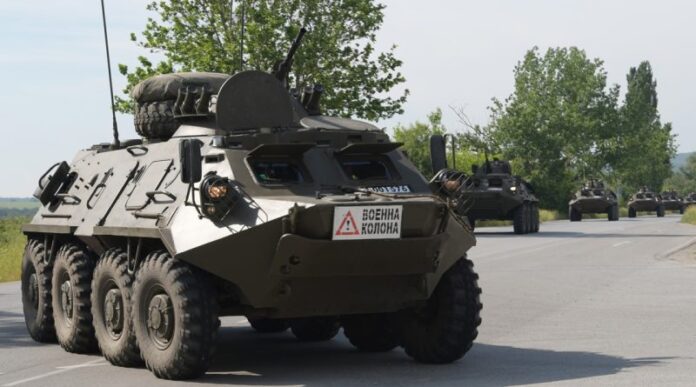
In a significant show of preparedness and defense coordination, Bulgaria’s Defence Ministry announced that between October 9 and 12, 2025, military personnel and equipment will be relocated across the country’s national road and railway infrastructure.
The large-scale movement marks the logistical phase of “Balkan 25,” the most important command and staff exercise of the year for the Bulgarian Land Forces.
The ministry emphasized that the drill is designed to test strategic readiness, enhance coordination among military formations, and evaluate the efficiency of logistics and communications networks essential to national defense.
Nationwide Relocation Underway
During the four-day period, citizens across Bulgaria may witness increased military presence on highways, rural roads, and rail lines. Convoys of armored vehicles, logistics trucks, and personnel carriers will move between bases and training zones situated throughout the country.
The Defence Ministry has assured the public that the exercises will be conducted under strict safety protocols, with cooperation from the Interior Ministry and national transport authorities to ensure smooth transit and minimal disruption to civilian traffic.
Authorities have urged motorists to remain cautious and avoid attempting to overtake military columns, particularly in regions where visibility and road space are limited.
Largest Command and Staff Exercise of 2025
According to official sources, “Balkan 25” represents the culmination of Bulgaria’s annual training calendar. It will involve thousands of troops from multiple garrisons, including specialized units in logistics, communications, engineering, and air defense.
The exercise’s command and staff component will test how well senior officers coordinate operational decisions, logistics management, and inter-unit communication in a simulated conflict environment.
The Defence Ministry noted that the exercise reflects the Bulgarian Armed Forces’ ongoing modernization and NATO interoperability efforts, ensuring that Bulgarian troops remain aligned with allied operational standards.
Strategic Readiness and Regional Security
Defense analysts describe “Balkan 25” as a strategically vital drill that strengthens Bulgaria’s ability to respond to emerging security challenges in the region.
Given Bulgaria’s geographic position at the crossroads of Europe and the Balkans, readiness exercises like these are viewed as crucial deterrence measures amid ongoing global uncertainties and shifting regional dynamics.
A senior defence official, speaking on condition of anonymity, said the drill aims to “simulate multi-branch coordination under realistic battlefield conditions, testing both command structures and logistical depth.”
He added that the goal is not only to train troops but also to refine the chain of command in complex, high-pressure operational scenarios.
Integration with NATO Standards
Over the past decade, Bulgaria has intensified efforts to modernize its armed forces in accordance with NATO’s strategic framework. Joint drills with allied forces have become more frequent, focusing on interoperability, rapid deployment, and cyber defense.
While “Balkan 25” is primarily a national exercise, elements of its training model are designed to mirror NATO’s collective defense principles.
Military observers suggest that such exercises also serve as readiness benchmarks for future multinational training engagements. “Exercises like Balkan 25 build not just internal discipline but also confidence in Bulgaria’s role within the alliance,” said a retired Bulgarian Army colonel.
Public Awareness and Transparency
The Defence Ministry has made efforts to maintain transparency and public awareness, issuing advisories and coordination notices to local authorities ahead of the troop movements.
Municipal administrations along major transport corridors were briefed about the routes and schedules to mitigate public inconvenience. Local police units have also been assigned to assist in traffic regulation during convoy movements.
Public communication officials reminded citizens that such exercises are routine and essential for national defense, not indicative of any emergency or escalating security threat.
Enhancing Command and Logistics Coordination
A central focus of “Balkan 25” is the optimization of logistics management, ensuring that command centers can effectively track and resupply forces deployed across multiple zones.
The Defence Ministry highlighted that real-time coordination between ground units and command headquarters would be a major performance indicator during the exercise.
Training will also include communication simulations, designed to test the resilience of Bulgaria’s military information networks against potential cyber interference — an increasingly important dimension of modern defense strategy.
Civil-Military Cooperation and Local Impact
Beyond the military objectives, “Balkan 25” will also serve as a test of civil-military cooperation. Emergency services, local governments, and law enforcement agencies are expected to play supporting roles during the exercise.
The Ministry of Defence has coordinated with the State Railway Infrastructure Company to ensure that troop and equipment transports are efficiently scheduled, minimizing impact on civilian freight and passenger trains.
Residents in regions hosting field training operations may experience temporary noise or restricted access to certain zones. However, these areas will be clearly marked, and safety personnel will be deployed to guide civilians accordingly.
Historical Context and Future Outlook
“Balkan 25” continues a long-standing tradition of Bulgaria’s autumn military drills, which have evolved in complexity and scale since the country joined NATO in 2004.
Previous exercises, such as “Balkan 24” and “Saber Guardian,” demonstrated the Bulgarian Army’s commitment to enhancing mobility, interoperability, and battlefield communication efficiency.
This year’s iteration is expected to integrate new technologies, including digital command systems, GPS-enabled logistics tracking, and unmanned aerial support for reconnaissance.
Experts view these developments as signs that Bulgaria is steadily moving toward a more agile, technologically equipped defense force capable of responding to modern security challenges.
Assurance of Normalcy
The Defence Ministry reassured citizens that all movements and exercises will be conducted in a disciplined, orderly manner, with no anticipated disruptions to public life or national infrastructure.
Authorities reiterated that these maneuvers are a scheduled training operation under the ministry’s 2025 strategic calendar. The public is encouraged to remain calm and to report any suspicious activity near military convoys to local authorities.
As Bulgaria continues to strengthen its defense readiness, “Balkan 25” stands as a powerful reminder of the nation’s commitment to ensuring peace, preparedness, and regional stability through disciplined training and inter-agency cooperation.
This article was created using automation technology and was thoroughly edited and fact-checked by one of our editorial staff members
